If you are a coffee lover, chances are that you heard this name before. In today's celebrity interview we present Michelle R. Johnson. Michelle is the CEO of Ghost Town Oats.
Ghost Town Oats is the world's first black and queer-owned oat milk company, led by baristas.
With a coffee background spanning over a decade, Michelle simply knows the market and its pain points. She wanted to cater to the dietary requirements of her customers while letting them enjoy the latte art as if it were full-fat, lactose-rich milk. She wanted it, so she did. In this interview, we covered all the barista basics, touched upon entrepreneurship challenges, and discovered what it takes to become a part of Michelle's team.
You have a math degree; how did you end up in the coffee business?
Michelle: One thing that you don't know about me, despite being a math nerd, is that I dropped out of college. At that time, my family was going through a rough patch, and we lived in a homeless shelter where I had to share a single room with my mom and four siblings. I felt it was too crowded, and I ended up couch surfing with some friends. I didn't want such a life for myself or my family. I decided to leave and pursue a career, so I ended up living with my aunt in Maryland.
Despite being my aunt, she wanted me to contribute to the household. My cousin and I went on a job hunt. Call it luck or desitny, we stumbled upon a coffee shop that agreed to interview me. I got the job without any previous experience. I got the job because I demonstrated my passion and love for coffee.
Fun fact: I started drinking coffee at the age of 4.
While I was in high school, I wanted to learn more about coffee and become a barista, but many coffee shops, including Starbucks, didn't want to hire me because I was too young.
I became obsessed with coffee in 2011 during my first coffee shop job. But I would say that my coffee career really shot off in 2012 when I started working at Bayou Bakery, which served specialty coffee. That's when I experienced coffee on a much deeper level than just making drinks. This was the place where I learned that there are coffee tasting notes. I learned about different coffee origins and where they come from. I was able to discern certain flavors and find different methods of making coffee.
I'm very into the step-by-step process of certain things. So, the process of bringing coffee from the farm to the cup was very interesting to me. I was eager to learn everything about coffee, from dial-in and espresso to latte art. The defining moment was when I found out that there are coffee competitions. I am secretly competitive, and it was in that moment that I thought I could be the best at something that I love, coffee. That was the thought that sealed the deal for me and my career path.
What were the challenges that you faced?
Michelle: The main challenge I faced while making my way as a barista was the concept of a glass ceiling. You reach a certain point where your skills are getting better, and you know that you're ready to take on more responsibility. For some reason, the people above you are trying to keep you at a certain level. So, I would make my way up to assistant manager, but never full store manager. There was a point in my career where I really wanted to shift into the marketing side of working at a coffee shop.
On my Instagram, I was posting a lot about work and coffee, and I started a blog that was very popular called The Chocolate Barista. I'm very good at creating communities in the online space. So, marketing seemed like a very natural next step. However, the office staff did not want me to work in marketing. They preferred that I stay in the coffee shop, which was unjust because I was already an award-winning barista.
I had gone on stages outside of Arizona to represent the company. I helped put that coffee shop on the map and put a spotlight on it. But they still did not want me to be anything more than just a barista. But that's where I decided to kind of create my own brand. I wanted to create my own lane and coffee shop so that I wouldn't have to keep hitting up against that glass ceiling working for other people.
I took that blog, The Chocolate Barista, and turned it into a platform. I started writing more about my experiences as a barista, being a black woman barista, and people loved it. The blog gave me the opportunity to work in marketing. The Chocolate Barista helped me become a journalist in the coffee space.
If you're hitting that glass ceiling in the space that you're in, take a leap of faith.
If you have that entrepreneurial spirit, go after it. It's a little bit scary, and you don't have to drop everything to go after it. You know, I think you'll feel more and more compelled to follow your own path over time.
That's what I've done in every job I've had. I have always had the urge to work for myself rather than for other people.
What motivated you to start your business?
Michelle: I was quite young. I was 23 and didn't really know what I was doing.
I get ideas about what I want to do, and the opportunities present themselves to me. Sometimes it's not the exact thing I envisioned, but that doesn't stop me from saying yes to it.
The most important factor when making such decisions is that they feel right. This approach to life led me to develop high levels of courage.
It is very scary to be on your own and put in the work to make your dreams come true. Despite being scary, I prefer to bet on myself than on someone else.
What are the skills an aspiring barista should develop?
Michelle: Fortunately for all aspiring baristas, now there are a ton of YouTube tutorials and videos on all the important barista skills. They can easily learn what the difference is between a latte, a cappuccino and a traditional macchiato versus what they serve at Starbucks.
I would have to say, that if you have the means, get yourself the equipment to practice. Get a decent espresso machine, as well as a milk frother. If you do this, you will be able to learn how to make these drinks at home.
The same goes for manual pour-over brews. There are so many resources on YouTube and Google on all the different pour over methods and the recipes that go with them. But there's nothing that's going to be like learning the job at a coffee shop. Because every coffee shop is different. They all offer different things and they also all have their own specific recipes.
One helpful thing that you can train at home is your palate development. Learn how to taste the difference between coffees, associate them with their origins. If you know how to taste coffee, then everything else is fully trainable! As a barista you should know that a Kenyan coffee is going to taste very different than a Guatemalan coffee. Guatemalan coffee is also going to taste different than Costa Rican, even though they're in the same geographical area.
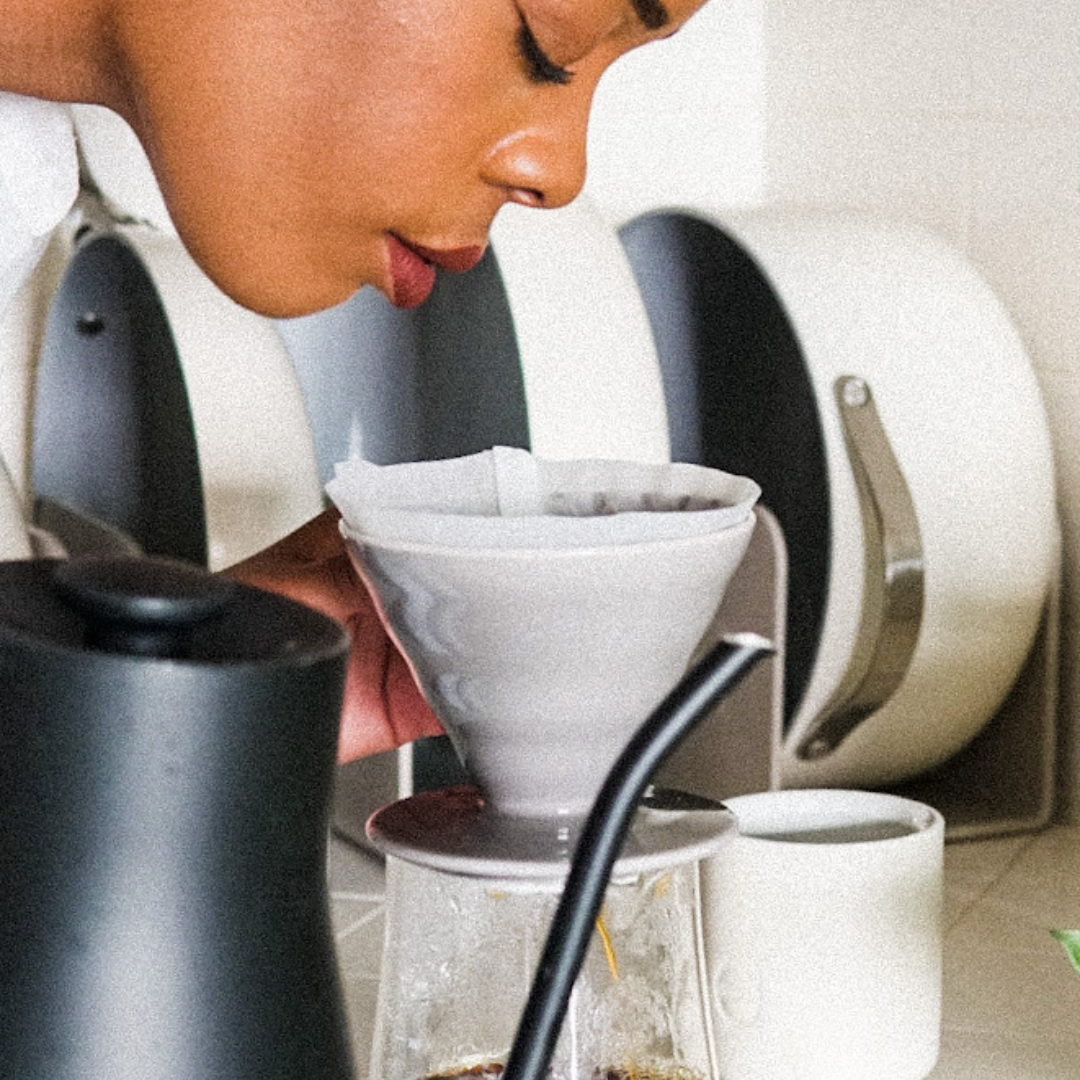
Learn the cupping method, which is a professional term for knowing these differences and developing a palate. Cupping is super easy, all you need is some cups, ground coffee and hot water. You can learn online how to do cupping, but palate development is always going to be the biggest key and going to help you to be able to work anywhere you want.
One non-negotiable and often overlooked aspect of becoming a barista is - you must love serving people. If you are not a people person you won't like this job. To be a great barista you need love and passion for the hospitality industry.
How important is mentorship?
Michelle: I will start by talking about the mentorship that I got. It was so crucial for me to have mentors who I found in my managers at that Bayou bakery spot very early on. Those guys really, really took me under their wing. They saw how passionate I was about coffee and about learning.
I was very nerdy, and I wanted to absorb all the knowledge they had. My mentors were happy to share it with me, so I learned about Kenyan and Guatemalan coffees early on. I developed my palate and learned about cupping.
My first mentors instilled a level of confidence in me that has carried me through my career! As a mentor you need to detect that sparkle in someone's eye. You need to make sure that the light inside them stays lit! I have seen people with a passion for this business, who have burned out due to poor mentorship.
When I mentor people, I make sure to inspire them. There are many baristas who don't want to stay baristas and pursue a career in a coffee shop, they want to be entrepreneurs or freelance barista consultants. As a company owner I provide adequate coaching to entrepreneurs. I try to show them what is on the business side. We talk about taxes, hiring, buying, supply management, all of it.
Can you share a little bit about the business side of running a company?
Michelle: A lot of people don't see all the details they have to take care of while running a business. They think that having a great product is all it takes to be successful, but it is way more than that.
If you want to start a business, start thinking about the unpleasant tasks such as taxes, paying invoices on time, ensuring that your rates are at the right amount.
Think about all the things that need to go into your rates, to be affordable to customers but also make revenue. It's not all rainbows and butterflies on this front.
Do you enjoy the business side of entrepreneurship?
Michelle: I admit that it is still a learning curve for me on the business side. Despite my math background, it didn't come naturally. Some things were natural, but other parts were quite challenging. Running a company or making myself a business makes sense, what was hard for me was pulling my expenses for the tax season, staying on top of every task, and multitasking between the creative and the practical part.
I'm not surprised culinary artists and baristas hate it, because it sucks. I think of everyone in the food and beverage world as creatives. Very creative people don't naturally like the analytical side of things, but because I have that math brain, I know that I must do it to create the space for me to stay creative on the coffee side.
I wouldn't say it came easier, but I knew how to find the help I needed to continue to build the business side. I still need help right now. I have a support system and advisors who help me with a lot of that stuff.
I've put myself through a couple of accelerators where I'm the only person with a coffee background, but everyone is there to learn about business. I find that helpful.
If you're trying to get into entrepreneurship, seek out those business classes to help crystallize your ideas and ensure that your creative juices, whether in food and beverage, have a foundation to keep them fortified and grounded so you can grow.
What is your favorite part of the job?
Michelle: My favorite part is making drinks. I've always loved making drinks for people. Being a barista always made sense to me.
At one point, I wanted to be a bartender, but I like having my nights off and didn't want to stay up all the time.
The act of making a drink that I know is delicious and that I crafted just brings me so much joy. Even now running an oat milk company, I know we've created something delicious that makes people feel good. I still get to be a barista on a larger scale with oat milk. There's something about making a drink, knowing it's good, giving it to somebody and seeing them enjoy it, that makes my heart sing.
If I could still just be a barista for fun, and it didn't hurt my body so much, I would. I love being behind the bar.
When hiring people to work with you, what are some of the qualities that you look for?
Michelle: I have two different answers for this question. The qualities I look for differ slightly when hiring for a coffeeshop and Ghost Town. When hiring for a coffee shop, previous coffee or food and beverage (F&B) experience isn't necessary because I'm willing to provide training.
I prioritize passion and willingness to learn, just like when I first started out. Back then, I didn't have the skills, but I had the drive to learn.
At Ghost Town, I prefer that candidates have previous or current experience working in a coffee shop or hospitality space because we are a hospitality company serving people, even though our primary product is oat milk.
While we're now serving thousands, even hundreds of thousands of people, we're still serving people. Having a background in hospitality and understanding our mission to serve people while taking care of ourselves is crucial.
My entire team at Ghost Town has coffee backgrounds, and some also have restaurant experience. We have a small team of five, but I need to tell you that our previous hospitality experience brings a different mindset. We all have agility; quick thinking and we are moving with purpose.
Even though we're not physically behind a bar, and we're sitting at computers, that same energy is essential. We're still a startup so everyone is kind of doing everything and things are moving very quickly.
What would be the one advice that you wish you had at the beginning of your career?
Michelle: The biggest tip is to stay organized, especially when it comes to your finances.
That is probably the biggest hiccup that I had starting out. It is not fun having to go back through your documents to find evidence to support your tax paperwork. Nobody wants to deal with it. More importantly you don't want the IRS coming after you for missing them. Fortunately, that has not happened to me, but you don't want to even have that worry.
Stay organized with your finances, with your expenses, making sure that you're paying yourself enough to not only cover those expenses but to cover the lifestyle that you want.
Typically, in the hospitality world we're used to being paid less, working for tips and just being happy with it, but moving into the entrepreneurial space at Ghost Town, we're really trying to combat that.
We're not at the place yet where I have a ton of benefits or can pay people a ton of money, but we make sure that people know that their self-sustainability is the most important thing here. Early on in my entrepreneurial career, I set my rates so low that I wasn't even able to take care of myself.
Don't burn yourself out. Don't run yourself into the ground. Make sure that if you're being paid, you're being paid well.
Stay organized, especially with your finances, pay yourself and make sure that you're taken care of because you are the business.
What are the next steps for you?
Michelle: Well, the next steps are that we are about ten days away from closing our second community equity round. We are raising money through the community again, and this time, it's not just a donation, it's for equity.
We are just under $12,000 away from our $50,000 goal. Outside of that, I'm also fundraising with larger investors. The next step is closing that round, which is for a very large amount of money: $ 4.5 million! I've never raised this amount of money before, but I'm ready and excited for it. I'm eager to talk to all these people who will be helpful on Ghost's journey.
After that, we're going to scale up so that we can reach national distribution status, not only in the coffee space but in food service as well.
Soon, Ghost Town will be available for your restaurant. So, watch out for it!
As for me, I want to get back into making and creating. I would love to be a home coffee influencer or spokesperson.
I just love making drinks, and COVID has brought that love home for many people. I want to help people create a coffee shop experience at home. I want to help them source equipment, get the right ingredients, and learn how to make their own syrups. All the stuff I learned in the coffee shop, you can do at home. It just takes some time, but it's higher quality because you know exactly what's going into it.
The Chocolate Barista: A Story of Dedication and Success
Now that you have met Michelle, you can see not only what it takes to be a successful barista but also what it takes to become an entrepreneur. It is clear that by being a barista, you can pretty much become anything, including the owner of a company. If you want to know how your career progression looks, we have prepared statistics for you.
One thing that has been a common dominator in all the celebrity interviews is that you must have a hospitality passion to be successful in any hospitality or restaurant role. If you don't have the passion, don't expect to make a career in this sector; however, you can still work in the industry to support yourself while making other plans. Some positions are paid quite well, and you can explore the earning potential for each position on our salaries page.
About Ghost Town Oats
Ghost Town Oats is the world's first black and queer-owned oat milk company, led by baristas. It was created by baristas for baristas, but that's not the only important thing. The company believes in community, and they allow their community to raise money for equity, further advancing the connections between the company and the community. Ghost Town Oats believes that everyone deserves healthy food and drink while enjoying the taste.


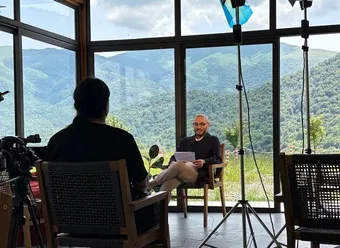
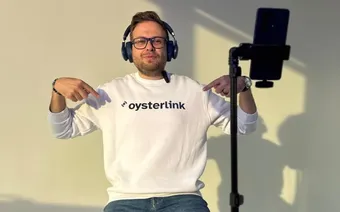
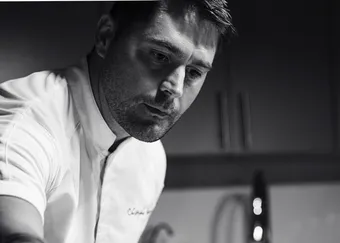
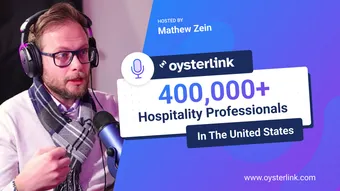
Loading comments...